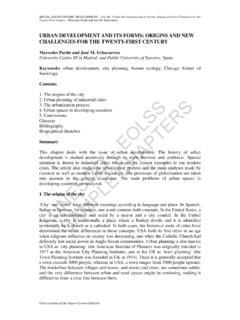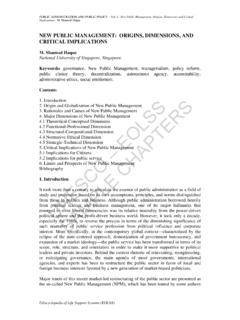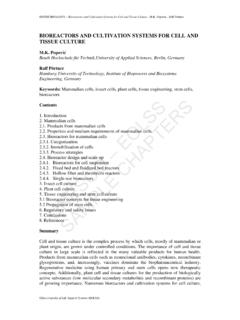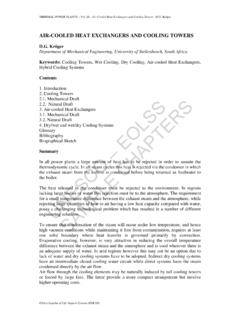Transcription of Functionalism and its Critics - EOLSS
1 UNESCO EOLSSSAMPLE CHAPTERSHISTORICAL DEVELOPMENTS AND THEORETICAL APPROACHES IN SOCIOLOGY Vol. II - Functionalism and its Critics - John Holmwood Encyclopedia of Life Support Systems ( EOLSS ) Functionalism AND ITS Critics John Holmwood Dept. of Sociology, University of Birmingham,UK Keywords: AGIL, Cause, conflict theory, culture, End of Ideology , function, functional unity of society, indispensability, latent functions, manifest functions, neo- Functionalism , norms, order, personality, rational actor, social integration, Structure, system integration, universal Functionalism , values Contents 1.
2 Functionalism in anthropology 2. Robert Merton: manifest and latent functions 3. Talcott Parsons: Functionalism as unified general theory Action and the Unit-Act Systems The Problem of Order Power, Values and Norms Personality, Culture, and the Social System Structural Differentiation 4. Criticisms of Functionalism : objections and alternatives Conflict Theory David Lockwood: Social Integration and System Integration Alvin Gouldner Rational Actor Approaches Neo- Functionalism : Jeffrey Alexander 5. Conclusion Acknowledgements Glossary Bibliography Biographical Sketch Summary Functionalists argue that society should be understood as a system of interdependent parts.
3 They believe that there are specific requirements functional prerequisites that must be met in all social systems and that these can provide the basis for the comparative analysis of social institutions. Functionalism came to the fore in North American sociology during the 1950s. This was a period of affluence, consolidation and growth in Western capitalism. Many commentators believed this marked an 'end of ideology' as Bell termed it. They did not mean that there was an end of ideology as such, but that the once defining ideological conflict of nineteenth century capitalism - essentially, that between a bourgeois ideology of 'radical individualism' and a socialist ideology of 'collectivism' - had lost its relevance.
4 Although North American functionalists were frequently progressive and liberal in their political outlook, the ideas of Marx and Marxism, which continued to UNESCO EOLSSSAMPLE CHAPTERSHISTORICAL DEVELOPMENTS AND THEORETICAL APPROACHES IN SOCIOLOGY Vol. II - Functionalism and its Critics - John Holmwood Encyclopedia of Life Support Systems ( EOLSS ) exert a significant impact on sociology in Europe, played little role in their work. This was the context in which the leading proponents of sociological Functionalism , Talcott Parsons and Robert Merton, came to prominence.
5 They sought to distinguish sociology from other disciplines, such as economics and psychology, and to celebrate its relevance to the new social problems of affluent capitalism. For Parsons, the 'end of ideology', heralded a 'new age of sociology'. In what follows, the origins of Functionalism in anthropology will be considered before going on to consider the key sociological contributions of Merton and Parsons. The final sections of the article will look at the different criticisms directed at Functionalism . 1. Functionalism in Anthropology Although Functionalism mainly came to prominence as a school of sociological theory in the 1950s, its origins can be traced to an earlier generation of writers working in the field of anthropology in earlier decades of the twentieth century.
6 These included notably the British-based anthropologists Bronislaw Malinowski (1884-1942) and Alfred Radcliffe-Brown (1881-1955). Elements of a functionalist way of thinking can also be traced to the work of the French sociologist, Emile Durkheim (1858-1917). A central methodological precept of these writers was that the actions of individuals are not to be explained by the immediate meanings they have for actors. They are to be explained by the function they serve for the wider social group. On this argument, individual meaning cannot be understood independently of a wider system of collective practices and beliefs within which it is embedded.
7 These collective practices, in turn, are to be explained by the functions they serve for the system of social life as a whole. Different elements of social life depend on each other and fulfil functions that contribute to the maintenance of social order and its reproduction over time. It is possible to illustrate this way of analysing social life by looking at a typical piece of explanation in early twentieth-century functionalist anthropology. Anthropologists observed how the hopi tribe of N. America engage in a complex series of rituals and dances prior to the planting of their crops.
8 It seemed clear that their dances cannot be understood as utilitarian behaviour that efficiently produces the rains with which they are closely associated. At the same time, it does not seem right to suggest that the hopi are behaving irrationally; at least, the claim that they are behaving irrationally looks suspiciously like a judgement from the perspective of our own beliefs based on the superiority of our scientific knowledge. From a functionalist perspective, the hopi rain-dance is not a form of instrumental activity, but a form of expressive activity that serves to reinforce the bonds of solidarity among the group.
9 This is especially important because the hopi live in dispersed shelters and the dance brings them together. Of course, in their other activities, such as planting and harvesting their crops, the hopi show themselves to be competent at organising instrumental activities, too. the hopi rain dances are thus explained by the function they fulfil in the life of the tribe as a whole. The function in question is that of the reinforcement of group solidarity. It is a small step from this to suggest that all social groups have to meet some universal UNESCO EOLSSSAMPLE CHAPTERSHISTORICAL DEVELOPMENTS AND THEORETICAL APPROACHES IN SOCIOLOGY Vol.
10 II - Functionalism and its Critics - John Holmwood Encyclopedia of Life Support Systems ( EOLSS ) and inter-connected requirements for example, as well as group solidarity, sexual reproduction, economic subsistence, social control, socialization and education of new generations, the management of sickness and death, etc. even if these are all handled differently within different societies. We may note that, in a typical case of functionalist explanation, the existence of a phenomenon or the production of an action is not explained by its direct efficient causes but rather by its indirect effects in relation to a social environment.












